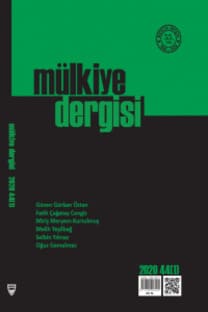‘İktidarda Popülizm’ veya Tedrici Bir İnşa Süreci Olarak 2002-2010 AKP Dönemi: Bir Çerçeve Denemesi ve Birkaç Temel Önerme
‘Populism in Power’ or the 2002-2010 Period of the JDP Government: Some Basic Propositions towards Framing a Period
___
- Açıkel F (2013). ‘Hegemonya’dan ‘Oximoron’a: AKP’nin Eğreti Bonapartizm’inin Sonu. Birikim, 288.
- Akça İ (2016). Türkiye’de 2000’ler: Güvenlik Merkezli Siyasetin ve Siyasal Güvencesizliğin Devamlılığı, Başlangıç.
- Althusser L (2006). İdeoloji ve Devletin İdeolojik Aygıtları. İstanbul: İthaki Yayınları.
- Arditi B (2007). Politics on the Edges of Liberalism. Edinburgh: Edinburgh University Press.
- Aydoğdu H ve Yönezer N (2007). Krizin Sözlü Tarihi. Ankara: Dipnot Yayınları.
- Campbell J (2010). Kahramanın Sonsuz Yolculuğu. İstanbul: Kabalcı Yayınevi.
- Canovan M (1999). Trust the People! Populism and the Two Faces of Democracy. Political Studies, XLVII, 2-16.
- Çelebi A (2002). Avrupa: HalklarınSiyasal Birliği. İstanbul: Metis Yayınları.
- Güneş H (2016). Şeriatı beklerken: Devletin İslamileşmesinde yeni eşik! Birgün, 25 Eylül.
- Hatem E ve Taştan C (2013). Kurgu İle Gerçeklik Arasında Gezi Eylemleri. Ankara: Seta Yayınları.
- Howarth D R (2008). Ethos, Agonism and Populism: William Connolly and the Case for Radical Democracy. BJPIR, Vol 10, 171-193.
- Kahraman H B (2009). AKP ve Türk Sağı. İstanbul: Agora Kitaplığı.
- Keyder Ç (2004). The Turkish Bell Jar. New Left Review, 28, 65-84.
- Laclau E (2005a). Populism: What’s in a Name? İçinde: F Panizza (der), Populism and the Mirror of Democracy, London: Verso.
- Laclau E (2005b). On Populist Reason. London: Verso Books.
- Laclau E ve Mouffe C (2001). Hegemony and Socialist Strategy. London: Verso. Marx K (1990). Louis Bonaparte’ın 18 Brumaire’i. Ankara: Sol Yayınları.
- Milliyet (16.08.2002). Kemal Derviş CHP yolunda: Cem’e veda Baykal’a merhaba. Mouffe C (2002). Demokratik Paradoks. Ankara: Epos Yayınları.
- Müller J-W (2014). ‘The People must be Extracted from within the People’: Reflections on Populism. https://www.princeton.edu/~jmueller/Constellations-PopulismJWMueller-March2014-pdf.pdf
- Müller J-W (2015). Populist Constitutionalism: A Contradiction in Terms? https:// www.wzb.eu/sites/default/files/u32/wzb-populist_constitutionalism-jwmueller16june2015.pdf
- Öniş Z (2005). The Political Economy of Islam and Democracy in Turkey: From the Welfare Party to the AKP. İnternet metni, adres bilinmiyor.
- Özkazanç A (2002). 3 Kasım Seçimi ve Sonuçlarına Dair. Konuşma metni, kaynak bilinmiyor.
- Palonen E (2009). Political Polarisation and Populism in Contemporary Hungary. Parliamentary Affairs, Vol. 62, No. 2, 318-334.
- Ramirez L C (2009). A New Perspective On Bolivian Populism. Master thesis, The Department of Political Science and the Graduate School of the University of Oregon.
- Roy O (2015). Siyasal İslamın İflası. İstanbul: Metis Yayınları.
- Smith A M (2003). Laclau and Mouffe: The Radical Democratic Imaginary. London and New York: Routledge.
- Türk B (2007). Genç Parti’yi Anlamak. Doktora Tezi, Ankara Üniversitesi, Siyaset Bilimi Anabilim Dalı.
- von Beyme K (2007). Populism and Right-Wing Extremism in Modern Democracies. İçinde: Nekvapil V ve Staszkiewicz M (der), Populism in Central Europe, AMO tarafından düzenlenmiş konferans metni. http://pasos.org/wp-content/archive/populism_amo. pdf
- Weyland K (2001). Clarifying a Contested Concept: Populism in the Study of Latin American Politics. Comparative Politics, Vol. 34, No. 1, 1-22.
- Weyland K (2003). Neopopulism and Neoliberalism in Latin America: how much Affinity? Third World Quarterly, Vol 24, No 6, 1095-1115.
- Yalman G (2002). Tarihsel Bir Perspektiften Türkiye’de Devlet ve Burjuvazi: Rölativist Bir Paradigma mı Hegemonya Stratejisi mi? Praksis, 5.
- Yalman G (2014). AKP Döneminde Söylem ve Siyaset: Neyin Krizi? İçinde: İktidarın Şiddeti: AKP’li Yıllar, Neoliberalizm ve İslamcı Politikalar, İstanbul: Metis Yayınları.
- Yetkin M (2016). AK Parti devrimi çocuklarını yemez, değil mi? Radikal, 3 Şubat.
- ISSN: 1305-9971
- Yayın Aralığı: 4
- Başlangıç: 1965
- Yayıncı: Mülkiyeliler Birliği Genel Merkezi
Ezilmiş ve Aşağılanmışlar: 1960’lar Türkiye’sinde Gecekondu Meselesi
Müştereklerimiz: Paylaştığımız Her Şey
Front National: Radikal (Popülist) Sağdan (Ilımlı) Neo-Popülist Sağa
Muktedir Millet, Muhalif Millet: AKP’nin Söyleminde Kolektif Öznenin İnşası
Öfkeden Umuda: İspanya’da Popülist Siyaset ve Podemos
Popülizmin Normatif İmkânları: Hınç ve Diğer Popülist Siyaset Biçimleri
